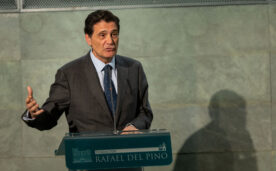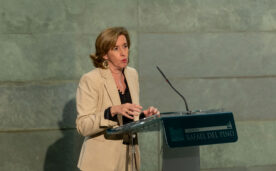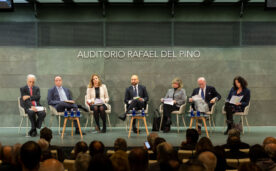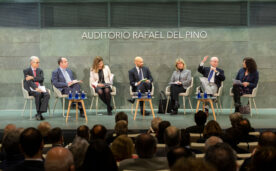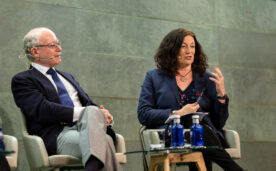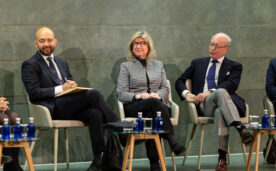José Luis Feito, Fernando Fernández Méndez de Andés, Jaime García-Legaz, Coriseo González-Izquierdo, Esther Gordo, Silvia Iranzo, Javier Serra Guevara and Jaime Requeijo (moderator)
Summary:
On 24 February 2020, the Rafael del Pino Foundation hosted the meeting "The external sector of the Spanish economy in the new international scenario", on the occasion of the publication of the monograph on the external sector published by the Madrid Association of Economists. The first speaker was José Luis Feito, member of the Board of Directors of CEOE, who pointed out that a country's external competitiveness should not only be understood as the ability of companies to compete abroad, but also their ability to compete with companies in their own country that produce non-tradable goods. This is important because a country's companies can be very competitive abroad, but this is a small sector because activities that produce non-tradable goods and services are much more profitable in that country. Feito considers that in order to know which are the most reliable indicators for measuring Spain's competitiveness, our country has a test that should be infallible for filtering the indicators. The Spanish economy had a great loss of competitiveness between 2001 and 2010 and had an intense recovery of competitiveness between 2012 and 2017. A good competitiveness indicator should be able to pick up these signals. The trade deficit, or the World Economic Forum's competitiveness indicator, do not reflect this reality. Relative price indicators for industry do not help either, because the importance of the services sector is enormous and, moreover, international trade in services has grown much faster than trade in goods in recent years. Export shares of goods are also useless for the same reasons. The best indicator for measuring competitiveness in Spain is the real exchange rate deflated by unit labour costs. In other words, the unit labour cost in Spain, divided by the unit labour cost in the rest of the world and multiplied by the effective exchange rate. Thus, if the rate of growth of our labour costs is higher than that of other countries, for example, those in the euro area, we are losing competitiveness. The rate of growth of unit labour costs is given by the increase in labour costs (wages, social contributions, etc.) minus productivity growth. The macroeconomic function of external competitiveness is to preserve macroeconomic balances, to reconcile the internal and external equilibrium of the economy. When competitiveness levels are adequate and when the country has the capacity to limit competitiveness losses and to regain competitiveness quickly, economic imbalances are less dramatic. Ultimately, macroeconomic stability affects medium and long-term growth. To preserve competitiveness, labour market reform needs to be addressed. This is because, due to the structure of the labour market, the deviation between labour cost growth and productivity growth in Spain is much larger and persists for much longer than in any other country because labour costs in Spain are much more rigid to unemployment. The other problem is taxation. In Spain, the percentage of labour costs represented by employers' social security contributions is much higher than in any other country. This is one of the sources of labour rigidity. The other part of the problem is the structure of taxation, because it has an excessive weight of direct taxes through social security contributions and taxation of savings, while it has one of the lowest indirect taxes in Europe. Jaime García-Legaz, former Secretary of State for Trade and director of Día and Aena Internacional, referred to the improvement in the implementation of public policies to support the internationalisation of Spanish companies. From 2012 onwards, an in-depth reform of foreign promotion policies was undertaken, concentrating them in a single body, the Icex, to facilitate synergies and efficiency. This led to significant gains in effectiveness and efficiency. Icex became an instrument for producing valuable and personalised information. In other words, it did not treat all companies the same, but rather gave personalised treatment to companies' requests for services. Icex also became a mechanism for generating high value-added services for companies that were not demanded by them. In this reform process, it is necessary to go a step further and take it to the financial instruments to support internationalisation, because they lack power and the appropriate level of effectiveness and efficiency that is required. There are direct loan instruments, managed by the Ministry, we also have a set of instruments managed by Icex, a third set managed by Cofides and, finally, Cesce, through export credit insurance. The proposal is to give much more power to these instruments. There are many export operations that do not go ahead because they do not have guaranteed financing from the State. Often, the export brakes come from the Ministry of Finance, because of the risk ceilings and the restricted nature of risk coverage. More attention should be paid to the ambition with which other European countries apply these export support instruments. It is a question of understanding the power of export credit insurance and that it is only insurance, i.e. if there are no claims, there is no insurance. All these instruments should also be concentrated in a single institution. Coriseo González-Izquierdo, former CEO of Icex and advisor to the Spanish Trade Office in Tokyo, stressed that one of the great values of Icex is that it is flexible enough to adapt to the needs of companies in different environments, thanks to its personalised attention. The transformation of the foreign sector of our economy has been truly spectacular. However, when we analyse our potential weaknesses, we see that some of the issues that are detected are issues that we have been talking about for many years, that we have largely overcome, but that we still have one more step to go from the point of view of promotion and the strengthening of instruments. From this perspective, there are three fundamental problems: increasing the export base, diversifying export markets and increasing the added value of our exports. The evolution of the export base has been very favourable since 2009. Since that date, the number of regular exporters has increased by 30%. However, the 0.3% of total exporters, which are the 510 largest regular exporters, continue to be responsible for 56% of our total exports. Regarding the diversification of export markets, geographical diversification is an issue that needs attention. In 2003, 75% of our exports went to the European Union, but, in the wake of the crisis, this percentage fell to 63% in 2012. Since then, it has gradually increased and now stands at 66%. In other words, attention must be paid to the trend. In this context, one of Icex's objectives is to address not only geographical diversification but also diversification of market access channels and diversification of different target audiences in different purchasing power segments and other characteristics within these markets. One of the most important challenges for Icex in this world of digitalisation, new technologies and e-commerce is to successfully carry out the active demand management initiative. Icex, with its network of offices, is stronger when it comes to designing activities that allow Spanish companies to approach new markets or intensify their presence in those in which they are already active, than in proactively and more frequently identifying the needs of potential clients in the markets, being able to give a very rapid response as to which are the possible Spanish suppliers to satisfy these types of demand. There are foreign markets in which there is a whole web of economic activity that escapes the statistics that measure Spain's bilateral trade relations with other countries. This is the case of Japan. Spain exports 2.5 billion euros worth of goods there every year, and Japan exports the same amount to Spain. But if we take, for example, the case of the three large Spanish automotive component companies, we see that they sell almost 1.5 billion euros to Japanese manufacturers outside Japan. In order to help these companies sell to these customers, it is necessary to take care of relations with Japan, because these decisions are taken at the headquarters. The set of free trade and association agreements that the European Union signs with third parties plays an important role in geographical diversification. Icex is very active in disseminating the business opportunities that arise from these agreements, because the EU itself believes that, however ambitious these agreements may be, the 40% of the opportunities they offer often go untapped due to a lack of awareness on the part of European SMEs. In terms of increasing the added value of our exports, we see that, in addition to technological content, there are many other innovation factors in which Spanish companies have demonstrated great excellence and which Icex supports very significantly, for example, gastronomy, the food industry and luxury companies. Icex is working on the incorporation of sustainability factors in the different export segments because it is a value that is increasingly taken into account. According to studies, one dollar invested in export promotion generates an increase of 87 dollars of additional exports. This is a good indicator to reinforce Icex's budget. Esther Gordo, economist at the Bank of Spain, commented that the shift towards protectionism in the United States is one of the most worrying and relevant events of the last two years. Relevant because of its implications for economic growth in the short and medium term, but, above all, relevant because of the threat it poses to the multilateral system of economic relations which, paradoxically, had been sustained by the drive of the United States. This change in the environment is very important for economies as open as those of Europe and, of course, Spain. There are three important issues. Protectionism is not a new phenomenon. We have been experiencing it for some years now. The difference is that now it is more aggressive. Secondly, on the road to internationalisation we have made mistakes that need to be addressed because they have contributed to creating the breeding ground for this protectionist tendency. Finally, despite these mistakes, protectionism and tariffs are never the right answer. Since the international financial crisis, there has been a steady rise in protectionism. It is a more subtle protectionism than tariffs, based on non-tariff barriers. This is already having an effect on international trade. It is in this context that Trump's aggressive protectionism is emerging. Among the factors that have contributed to the emergence of this phenomenon is the growth model of the Chinese economy, which is still dominated by a system of cheap credit, unclear competitive practices, the imposition of forced technology transfers on companies that want to set up there, and a policy of labour rights and environmental protection that gives it a competitive advantage over other economies with stricter regulations. The second element is that the World Trade Organisation has not been able to adapt with the appropriate flexibility to the new times. It has not been able to embrace new forms of trade, it has not been able to bring new trade agreements to a successful conclusion, and its dispute settlement system is slow and inflexible. The system is therefore in need of an overhaul. Finally, the most important element is that it has been too naïve in assessing the effects of free trade on certain segments of the population. Tariffs, however, are not the right answer. Trade wars are not easy to win because they involve widespread losses for all actors involved. Tariffs that have been lifted since 2018 have slowed global economic growth by 0.5 percentage points. Moreover, there are two elements that make these effects significantly amplified. The first is uncertainty, because tariff increases have been accompanied by continuous threats. This has created a climate of uncertainty in which it is not easy to make investment decisions or to initiate new relationships. This effect is as important as the effect of tariffs. The other element is the impact of tariffs through global value chains. In this regard, studies show that in a trade war, both China and the US lose, although China loses more, with no improvement in the trade deficit. Silvia Iranzo, former Secretary of State for Trade and advisor to the ICO, indicated that the balance of payments of ten years ago has in common with the current one the trade deficit, which has always been with us. However, while it was very high in 2008, it has now moderated, which reflects the efforts that have been made. This trade deficit has been compatible with an increase in exports over the last ten years. 300 billion, with a cumulative annual rate of growth of 4%. There has been an export miracle here, but our share of exports was maintained, when it declined in Germany, France, Italy, USA, UK, which is very commendable. The government has helped to better meet the needs of exporting companies, but the companies are the real protagonists of this miracle. Exports are now changing cycle. The slowdown is evident because of the global economic slowdown, global trade tensions, Brexit uncertainty, the retreat in globalisation. The services balance has also been a common feature over the last ten years. It has always been in surplus, but not as much as now. We still have a surplus in tourism, but we are also starting to become a power in non-tourist services. Another element that has accompanied us is the deficit in the secondary income balance, due to the movement of funds with the EU and immigrant remittances. As differential elements we have, firstly, the turnaround of our current account balance, which has gone from a deficit of 10% of GDP, the second largest in the world after the United States. This swelled our external debt. Now, since 2013, we have a current account surplus, albeit a slowing one. The lack of diversity in our exports, too concentrated in the European Union, has been reversed somewhat, but not enough. We have increased exports to Asia somewhat, but not enough. This is our unfinished business. By sector, the proportion of exports in the food sector and in textiles continues to increase. The problem is that these sectors are the most exposed to the imposition of tariffs. We have also improved the balance of the primary income balance, due to the fact that we pay very little for our public debt thanks to the ECB's purchase programmes. Spain's investment abroad continues to increase. We continue to be very competitive in attracting foreign investment. The net international investment position, however, is a debtor one. This is a vulnerability if foreign capital decides to withdraw. In this area, we are in a very similar situation to 2010. The debtor position is due to public debt, so it is necessary to reduce it and, to do so, the public deficit must be reduced. We must also reduce energy dependence, try to export technology-intensive goods, for which we must invest in R+D+i and improve education, as well as improve the quality of the tourism sector. Finally, Javier Serra, Director General for the Internationalisation of Business at Icex, pointed out that our countries have a lot of international strength and the capacity to increase their export presence, going to markets in which they are not yet present, in sectors such as automobiles, pharmaceuticals, chemicals, olive oil, aircraft, ceramic products, wine and pork. The sectors in which there is potential future demand for Spanish exports are related to new technologies, the development of services, sustainability and climate change, and demographic trends such as the ageing of developed countries. On the supply side, the sectors in which Spanish companies have future potential would be all those linked to the water cycle, the new mobility of goods and services, sustainable consumption, audiovisual entertainment, sustainable and resilient infrastructures, techno-finance, red and green biotechnology, space aeronautics and cybersecurity.
The Rafael del Pino Foundation is not responsible for the comments, opinions or statements made by the people who participate in its activities and which are expressed as a result of their inalienable right to freedom of expression and under their sole responsibility. The contents included in the summary of this conference are the result of the debates held at the meeting held for this purpose at the Foundation and are the responsibility of their authors.
The Rafael del Pino Foundation is not responsible for any comments, opinions or statements made by third parties. In this respect, the FRP is not obliged to monitor the views expressed by such third parties who participate in its activities and which are expressed as a result of their inalienable right to freedom of expression and under their own responsibility. The contents included in the summary of this conference are the result of the discussions that took place during the conference organised for this purpose at the Foundation and are the sole responsibility of its authors.

